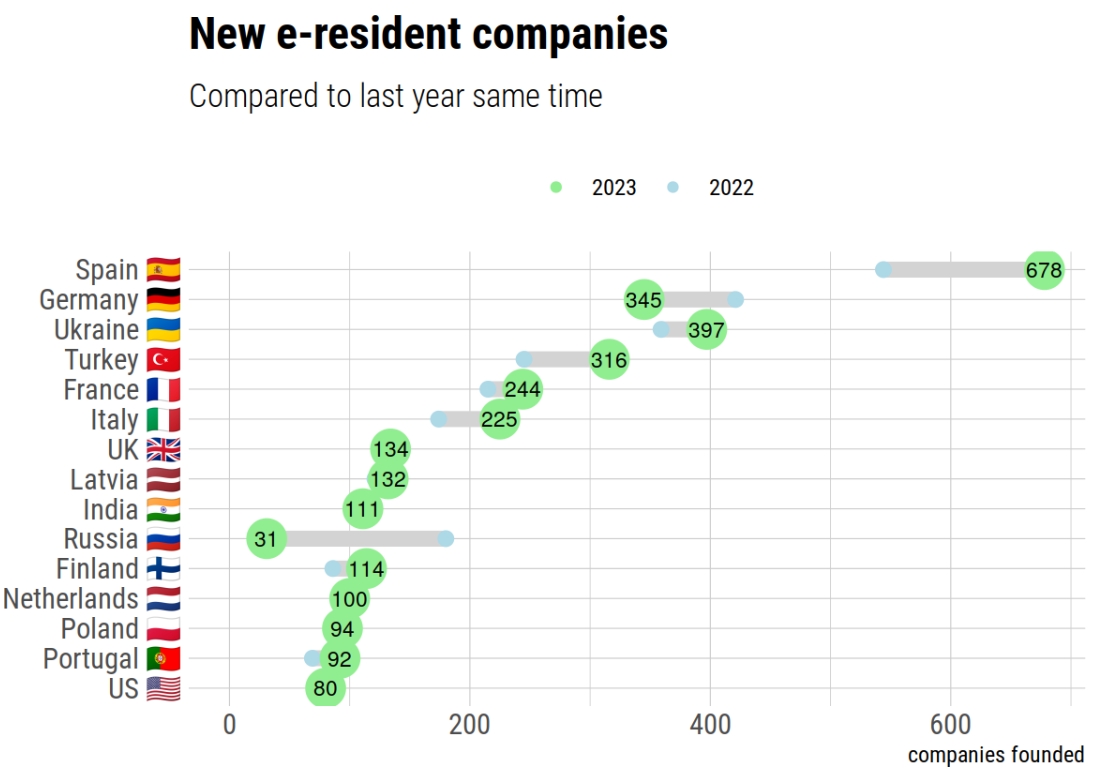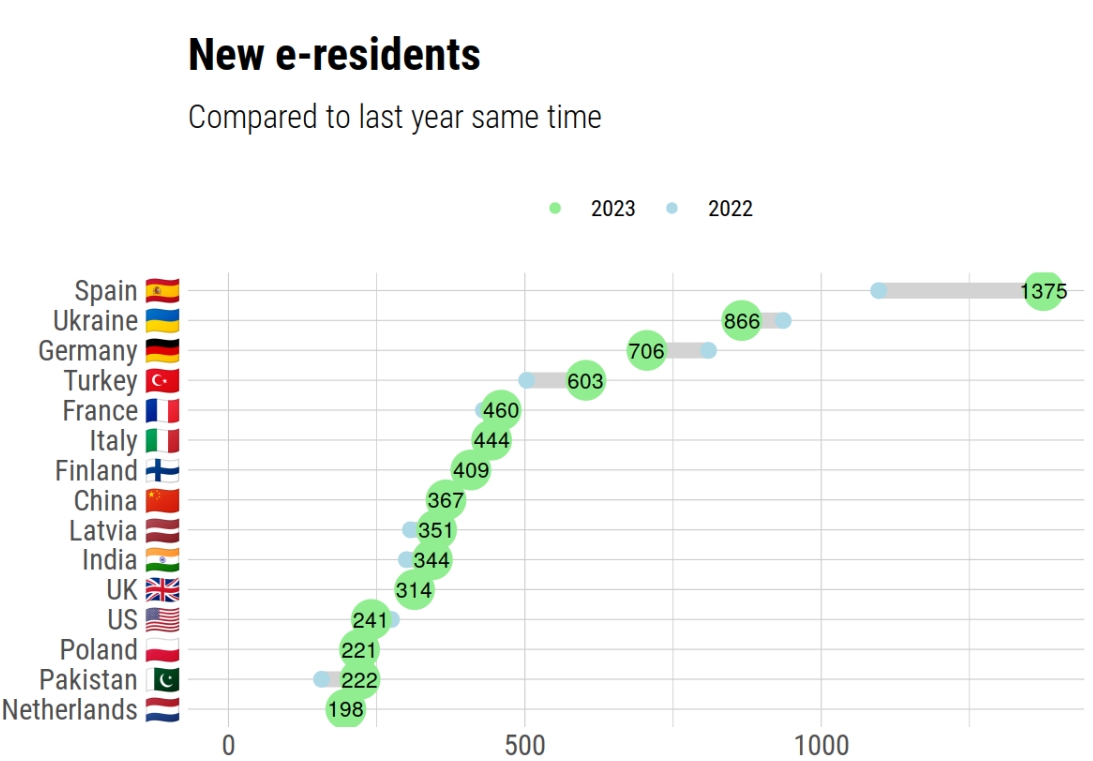

In an engaging and forward-looking conversation with our Managing Director, Ivar Veskioja, we explore the horizon of opportunities and changes awaiting Estonian e-residents in upcoming years. Amidst the drive toward perfecting the Estonian digital ecosystem and regulatory shifts, Ivar unveils how Unicount is building an online platform to provide more integrated services to e-resident founders and refining its support for navigating all available opportunities.
This dialogue includes a sneak peek into forthcoming strategic leaps in Estonian e-services, an explanation of why we need enhanced KYC processes and adjustments to the list of supported countries, and a look back at the achievements of the e-residency program in 2023.
Interview with Ivar Veskioja, Managing Director of Unicount
Adam: With 2024 unfolding, what can current and future Estonian e-residents expect this year, especially those running or looking to start companies here with the help of Unicount?
Ivar: It will be an exciting year. Estonia is not an island untouched by global megatrends. We are already witnessing a global reshaping of power and international politics. Major elections will be held worldwide. Meanwhile, Europe seeks a return to economic growth while granting sufficient funds and resources to maintain Ukraine as an independent country and EU candidate member.
We’re seeing more vigorous government interest in selling their ecosystems internationally by creating their e-residency programmes. This includes attempts to make it easier to start and manage companies. Discussions around boosting national economies with subsidies and tax breaks compete with rising welfare costs for the ageing population. At the same time, inflation and low growth outlooks raise concerns over balancing state budgets without tax increases or austerity measures. High interest rates for new debt hamper contracyclical public investments.
Adam: That sounds very difficult for the Estonian government and the EU. Are there any updates e-residents should look out for?
Ivar: Yes and no. We will most probably have a stable coalition government for the next three years. One major update is the 2025 income tax increase, which means that any undistributed business profits could be paid out to shareholders this December before the 2% rate increase kicks in.
E-residents can also expect more pressure from licensed service providers that must gear up their due diligence measures to match regulators’ and banks’ expectations. Additionally, we’re working closely with the government to further the idea of enabling European eID support in the e-Business Register. It would be a game-changer for the ecosystem if millions of European founders could access the e-residency ecosystem immediately with their European eID.
At the same time, the e-residency team is looking for alternative online Estonian eID issuing opportunities to grant access to the Estonian e-services without waiting for the e-resident card to be delivered physically. It sucks if you must wait eight weeks to start a company online while you may already have some form of government-issued digital identity that we could support to let you register your company in 1 day. The problem is that Estonian legislation requires the highest security level eID with signature certificates. At the same time, many EU countries haven’t even issued eID means to their populations with digital signature functions and security on the required level.
A simple way to bypass it is by not demanding a signature certificate from an EU eID user who does not have it. We could also issue you an Estonian eID based on your foreign eID. We need to acknowledge, though, that for many people, the Estonian eID may be their first digital identity, as in their country, it is not mandatory to have one.
Adam: How does Unicount plan to navigate these potential changes?
Ivar: We focus on grasping new opportunities when they open and try to remain at the forefront of easy company registration and management in Estonia. We’re also enhancing our advisory services in 2024 to cover more than the basics of starting and running a business in Estonia. This would mean more services to handle your tax and compliance. We aim to empower international founders to start companies in Estonia, be self-sufficient and thrive in a global marketplace.
Adam: With tax changes of 2024 and 2025, how will this affect e-residents?
Ivar: The Standard VAT rate increased to 22% this January, making most services you buy in Estonia 2% more expensive if you are not registered for VAT. In 2025, e-residents can expect corporate and personal income tax rate adjustments. This was the government’s unpopular solution to fill the gap in the state budget. We’re closely monitoring all these changes to provide our clients with the latest tax advice and ensure compliance. The good news is that you only pay tax in Estonia if you distribute dividends or pay salaries.

We need to ask more questions
Adam: There’s talk about increased KYC (Know Your Client) requirements due to pressure from the Estonian regulator, FIU. How will this impact e-resident founders?
Ivar: Transparency and trust are pillars of the Estonian digital economy and e-residency. While some innovative steps were made too fast, after storming, there will be norming to regulate the accidental innovation that occurred. This means more oversight over e-resident businesses, tougher licencing policies, etc.
Better KYC measures are needed to maintain and outperform international standards. Some of our past storming period issues were highlighted in the Moneyval report, including thousands of crypto licences issued. Generally, it means more questions from licensed service providers to company managers and beneficiaries. For us, it could mean enrolling clients in mandatory accounting plans to be able to perform our due diligence measures. The shift in policies will impact all of us to build and maintain a safe and transparent business ecosystem.
Adam: How is Unicount adapting its policies with the increasing regulatory burden?
Ivar: Great question, Adam. In response to the regulatory shift in the ecosystem, we’ve had to make tough decisions about the countries and citizenships we can support. This means that citizens and residents of some countries will not be able to use our services. For the rest, it means more questions; we need to know your business and clients better than we do now. This is necessary to stay in the business for the long run. By refining our KYC processes, we aim to meet regulatory standards without increasing prices.
Adam: Will there ever be general access to the Estonian banking system for e-residents?
Ivar: Sadly, no. Financial institutions are under heavy scrutiny for everything that relates to non-resident banking. The trend started in January 2017, meaning many business bank accounts of e-residents were closed years ago. Some countries’ citizens and residents could not get reliable financial services even if they got their e-resident cards. At the same time, the rest had to accept fintech options such as Wise or Revolut. With Wise not accepting new EU businesses, we had to reorientate ourselves. E-residency has effectively decoupled from the Estonian banking system.
e-Residency Programme
Adam: Considering the Estonian economic situation in 2024, how do you see the e-residency program contributing to tax revenues and the broader service industry?
Ivar: As Estonia continues to build on top of its position as a digital leader in the EU, the e-residency program plays a crucial role in our shift towards creating more online services for international clientele. Building an outstanding digital ecosystem for 1 million domestic non-paying users is expensive. Adding even 100,000 companies paying taxes and fees in Estonia would mean hundreds of millions of euros of direct income that can be used to build the digital infrastructure for the next decade.
Even if we want to get only the best international entrepreneurs who would contribute the most to the state tax revenue, the economy does not work that way. We have to attract a lot of e-resident founders to Estonia. 20% will build a scalable business, and 20% will pay 80% of taxes. This means that 100,000 founders will build 20,000 great companies, and 4000 will contribute 80% of the program’s tax revenue.

For 2024, we anticipate a significant contribution to tax revenues from e-resident businesses, driven by macroeconomic improvements and corporate income tax changes. The program’s direct revenue has and will continue to impact Estonia’s internal discussions on financing our state by attracting more taxpayers with some mitigated risks involved.
Adam: Can you share some highlights from the e-residency program’s performance in 2023?
Ivar: The program saw steady performance in terms of new e-residents and companies established in Estonia. This continuing interest reflects the global recognition of Estonia’s e-residency as a leading digital business management platform, offering unparalleled access to the EU market and digital services entirely online. There was a significant surge in applications from Spain, while the other top countries of e-residents stayed the same. 10,910 new e-residents and 4592 new companies registered in 2023 keep the ecosystem growing.

Adam: Finally, what message do you have for current and prospective e-residents?
Ivar: Estonia’s ecosystem for e-resident founders is ever-evolving, and with Unicount, you have a partner dedicated to your success. Whether you’re just starting or looking to expand to Estonia, 2024 is a year of opportunities, and we’re here to support you every step of the way.
Adam: Thank you Ivar, it has been a very well-laid executive summary of the shifts in the ecosystem.
Ivar: My pleasure. I am always happy to share my thoughts with the community. It will be ten exciting years working with e-residency this December.
Thanks for reading
We hope you enjoyed this interview with our Managing Director. I am looking forward to continuing this interview format next year.






